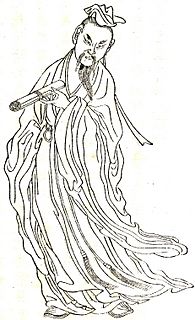Ban Gu facts for kids
Quick facts for kids
Ban Gu
|
|
|---|---|

Ban Gu, 1st-century Chinese poet, historian, and compiler of the Book of Han
|
|
| Born | AD 32 |
| Died | AD 92 (aged 59–60) |
| Other names | Mengjian |
| Occupation | Historian, poet, politician |
| Known for | Book of Han |
| Relatives | Ban Biao (father) Consort Ban (grand-aunt) Ban Chao (brother) Ban Zhao (sister) |
| Ban Gu | |||||||||||||||||||||||||||||||||
|---|---|---|---|---|---|---|---|---|---|---|---|---|---|---|---|---|---|---|---|---|---|---|---|---|---|---|---|---|---|---|---|---|---|

"Ban Gu" in Chinese characters
|
|||||||||||||||||||||||||||||||||
| Chinese | 班固 | ||||||||||||||||||||||||||||||||
|
|||||||||||||||||||||||||||||||||
| Alternative Chinese name | |||||||||||||||||||||||||||||||||
| Traditional Chinese | 孟堅 | ||||||||||||||||||||||||||||||||
| Simplified Chinese | 孟坚 | ||||||||||||||||||||||||||||||||
| Literal meaning | (courtesy name) | ||||||||||||||||||||||||||||||||
|
|||||||||||||||||||||||||||||||||
Ban Gu (AD 32–92) was a famous Chinese historian, politician, and poet. He is best known for his big part in writing the Book of Han. This book is one of China's 24 official history books about its past dynasties. Ban Gu also wrote many fu, which are a special kind of writing that mixes prose (like regular sentences) and poetry. These fu were very popular during the Han era.
Contents
Ban Gu's Family
The Ban family was one of the most important families during the Eastern Han dynasty. They were known for being smart and successful. Long ago, during the Warring States Period (a time when different parts of China fought each other), a man named Ban Yi moved his family north.
Later, Ban Gu's ancestors became well-known on the northwestern border. They raised thousands of cattle, oxen, and horses. They ran a big business trading these animals. This helped other families move to the border too. Eventually, Ban Gu's father, Ban Biao, moved the family to Anling, which is near modern Xianyang.
Talented Relatives
Ban Gu came from a family of talented people:
- His great-aunt, Consort Ban, was a scholar and a poet.
- His father, Ban Biao, was a famous historian. Ban Gu took over his father's work on a history of the earlier Han Dynasty. This book is now called the Hanshu or Book of Han.
- His twin brother, Ban Chao, became a famous military leader and explorer. He traveled to Central Asia.
- His sister, Ban Zhao, was one of the most famous female scholars in Chinese history. She helped finish the Book of Han after Ban Gu faced difficulties.
Ban Gu's Life and Work
Ban Gu's father, Ban Biao, passed away in AD 54 when Ban Gu was 22 years old. After his father's death, Ban Gu spent time thinking about what he wanted to do with his life. He wrote a long fu about his thoughts called "Fu on Communicating with the Hidden." This writing is famous because it was one of the first fu used to discuss big ideas and questions.
Ban Gu did not start an official job right away. Instead, he stayed home to continue his father's work. His father had started writing a history book that would follow Sima Qian's famous Records of the Grand Historian.
Around AD 60, word reached Emperor Ming of Han that Ban Gu was "secretly rewriting the national history." The emperor's court worried about what Ban Gu would write about the fall of the Western Han and the start of the Eastern Han. Ban Gu was arrested, and his family's library was taken away. Luckily, his brother Ban Chao spoke up for him, and Ban Gu was released.
After his release, Ban Gu was given the job of writing about Emperor Guangwu of Han, who was the first emperor of the Eastern Han. In AD 64, he was given a job in the imperial library, helping to organize books. He was also promoted to a higher rank. Emperor Ming was so impressed with Ban Gu's work that in AD 66, he allowed him to continue working on the history of the Western Han. Ban Gu worked on this important book for the rest of his life.
Ban Gu continued to work in the imperial library and at the emperor's court for many years. During the rule of Emperor Zhang of Han, Ban Gu was promoted again. Later, he worked for a high-ranking official named Dou Xian. However, Ban Gu faced political problems. He was removed from his job and arrested by an old rival. Ban Gu died in prison that same year, at 61 years old.
Ban Gu's Impact
Ban Gu's work had a lasting impact on how history was written in China.
- The modern historian Hsu Mei-ling says that Ban Gu's writings on geography helped start the tradition of including geography sections in history books. This likely led to the creation of gazetteers (books listing places and their features) in ancient China.
- Many scholars, both Chinese and Western, now see China's history in terms of different dynasties. This way of looking at history is thought to be a direct result of how Ban Gu chose to write the Book of Han.
Ban family
- Ban Biao (班彪; 3–54; father)
- Ban Gu (班固; 32–92; first son)
- Ban Chao (班超; 32–102; second son)
- Ban Xiong (班雄; ?–after 107; Ban Chao's eldest son)
- Ban Shi (班始; ?–130; Ban Xiong's son)
- Ban Yong (班勇; ?–c. 128; youngest son of Ban Chao)
- Ban Xiong (班雄; ?–after 107; Ban Chao's eldest son)
- Ban Zhao (班昭; c. 45 – c. 117; daughter)
See also
 In Spanish: Ban Gu para niños
In Spanish: Ban Gu para niños
- Han poetry
- Twenty-Four Histories
 | John T. Biggers |
 | Thomas Blackshear |
 | Mark Bradford |
 | Beverly Buchanan |

